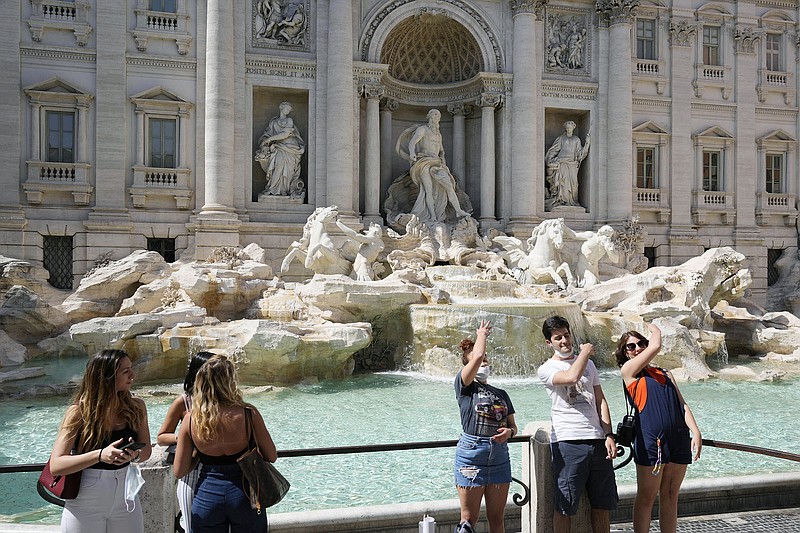BRUSSELS -- In a rush of hope that Europe has turned the page on its pandemic ordeal, the European Union on Friday urged its member countries to open their doors to U.S. leisure travelers after more than a year of tight restrictions and economic slump.
Most countries are expected to open to Americans immediately -- if they haven't already -- including Germany, France, Italy, Spain, Portugal and Greece. For the tourism powerhouses of Europe, especially, the ruling offered long-awaited relief that they could begin recouping their economic losses from the pandemic as summer weather arrives.
"We have a lot of American guests and we actually stayed in touch with them over the pandemic," said Richard Fischer, 37, a general manager at the Circus Hotel in the heart of Berlin. "They are really looking forward to coming, and we are looking forward to having them!"
A recent rise of cases in Europe involving coronavirus variants prompted some caution about the EU's move, and calls for continued vigilance. But after an early struggle to secure vaccines for many Europeans, the improvements in vaccination and case counts that allow the opening are crucial signals that the bloc can still deliver for its members in times of trouble -- a significant moment of cohesion in the wake of Britain's exit from the union.
[CORONAVIRUS: Click here for our complete coverage » arkansasonline.com/coronavirus]
Friday's decision was made by Europe's economy ministers, who agreed to add the United States to a list of countries considered safe from an epidemiological point of view. That means travelers from those countries should be free to enter the bloc even if they are not fully vaccinated, on the basis of a PCR test showing no active coronavirus infection.
But the European Union cannot compel member nations to open to U.S. visitors. Each country is free to keep or impose more stringent restrictions, including obligations to quarantine upon arrival or to undergo a series of further tests.
Countries like Greece and Spain, more heavily dependent on tourism, already moved in recent weeks to reopen to tourists from outside the European Union, including from the United States. The European Commission, the bloc's executive branch, criticized those early moves.
Anticipating the ruling, France on Wednesday began laying the groundwork for more visitors, saying it was ending a mandate on mask-wearing outdoors and lifting a nighttime curfew. The result was a national sigh of relief that cafe life could fully return.
On Thursday, France placed the United States and Canada in its "green" category of countries, opening the door for tourists.
[Video not showing up above? Click here to watch » https://www.youtube.com/watch?v=wNatSHJlZZY]
EU BATTLES U.S.
The move will also provide a boost for major U.S. carriers like United, Delta and American that fly the world's most-profitable routes alongside European peers Air France-KLM and Deutsche Lufthansa. Long-distance travel, a segment laden with premium customers paying for business- and first-class seats, has been hit hard by restrictions brought on by the pandemic.
The decision is "great news for the EU economies and all transatlantic travel supply chain participants," said Martin Ferguson, vice president of public affairs at corporate travel agency American Express Global Business Travel. "We anticipate a strong return of bookings on these routes."
But the opening is so far just one-way: Europeans are still barred from entering the United States for nonessential travel even if they have been fully vaccinated.
The EU is pushing the Biden administration to reciprocate by lifting curbs for its citizens, as vaccinations progress across the continent and the number of coronavirus infections falls sharply.
Some diplomats in Brussels were wary of allowing Americans to return before the U.S. agreed to a corresponding reopening. The bloc decided to go ahead amid pressure from the tourism-dependent economies ahead of the summer season.
The U.S. launched a series of working groups, including with the EU, on border reopening during Biden's recent visit. A White House official, speaking on condition of anonymity, said that work is ongoing and no decisions have been made.
"We are in close contact with the U.S. administration on the issue of safe resumption of all travel between the EU and the U.S. and we've received assurances that this is a high-priority issue for the U.S. administration," European Commission spokesman Adalbert Jahnz told reporters Friday.
While U.S. carriers make large profits from transatlantic routes, their recovery has benefited from a rapid rebound in domestic flying that European airlines can't match. Ticket sales in the U.S. in May grew 18% compared with April, the fifth straight month of growth, according to data from Airlines Reporting Corp.
CANADIAN RESTRICTIONS CONTINUE
As for Canada, border restrictions on nonessential travel will be extended until July 21, officials said Friday, as Canada works to get a higher percentage of its population fully vaccinated.
Public Safety Minister Bill Blair said the move has been made in coordination with the U.S. There are growing calls in the U.S. to open the Canada-U.S. border for nonessential travel like tourism, but less than 20% of Canadians are fully vaccinated.
"We're still seeing cases across the country and we want to get them down," Prime Minister Justin Trudeau said. "At the same time, we also know we have to hit our targets of 75% vaccinated with the first dose and at least 20% vaccinated with the second dose before we can start loosening things up, because even a fully-vaccinated individual can pass on covid-19 to someone who is not vaccinated."
Trudeau said Canada needs to ensure communities to which fully vaccinated travelers return are not at risk
"Even though they are protected from hospitalization, the people around them might not be," he said.
Two members of the U.S. Congress who co-chair the Canada-U.S. Interparliamentary Group criticized the extension.
[Gallery not loading above? Click here for more photos » arkansasonline.com/619covid19/]
New York Democrat Brian Higgins and Michigan Republican Bill Huizenga decried the lack of transparency around the border talks between Canada and the U.S. as a disservice to residents on both sides of the border who are waiting to see loved ones and renew business ties.
Information for this article was contributed by Monika Pronczuk of The New York Times; by Nikos Chrysoloras, Joao Lima, Alberto Nardelli, Katharina Rosskopf, Josh Wingrove and Richard Bravo of Bloomberg News (TNS); and by Rob Gillies of The Associated Press.


